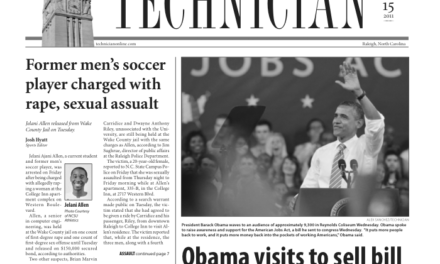When asked about the Transition Program, many students at N.C State may respond by saying “What is that?” The Transition Program is for students who were not deemed competitive enough for their college by either not having a sufficient SAT score, and/or a low grade point average. According to Danereka Sinclair, freshmen currently in the Transition Program, “It is good for networking, developing study skills, and good work ethic.” The Transition Program is an extension of First Year College Program; however, it has special requirements. The Transition Program requires its students to attend a mandatory study hall, convocations, life coaching sessions, and an academic major’s fair. The study hall, also known as SASI (Supplemental Academic Support Initiative), requires the students to do up to eight hours per week of constructive studying. Even though that seems like a lot to do on top of classes, many students do not mind the commitment and effort that it takes to attend. According to freshman, Taylor MacBain in the program, “SASI is a great academic setting that allows you to stay focused on studying with little or no distractions.” SASI consists of a single proctor in each room that helps the environment stay suitable for studying.
The advisors of the Transition Program are Mr. George Morell and Ms. Julie Nelson (a new addition to the Transition Program). They are always there to help their advisees; if you have any problems just stop by or email them. The program director is Mrs. Frankye Artis. They all go out of their way to help their advisees to get on the right track. They even went to the extent of hiring the Transition Program a personal tutor, by the name of Mr. Paul Rencibia, who offers help in Math and Spanish. Ryan Moseley, a freshman in the Transition Program, stated, “I think that the Transition Program is a wonderful support system that encourages you to make good grades, meet new people, and develop study skills.”
I think the Transition Program should not be for a selected few, but for every First Year College student on N.C State’s campus. The strategies and requirements that are applied in the program will help them with getting ahead, and develop fundamental skills that will be beneficial in the real world. All the students that take ECD 101 and 102 during their freshman year will not only help be helped within their college life, but will also be able to find themselves. What I mean by “find themselves” is that it will help them to figure out their learning strategies, and shape their priorities. The required life coach sessions allow you to address personal problems and opinions about certain things that you feel strongly about. It is similar to a counseling session, and it will help you overcome problems or find a way to handle things in an orderly manner. It is normally a group session, but you can also request a single session if you want to be more personal. Although these services are provided all around college, the Transition Program brings it all together in one setting. That is what makes the Transition Program a big family; they do everything together and see the same people every day. This is the basis for networking and socializing with people that you can relate to.
The Transition Program admits all kinds of students but the majority of students that are admitted are African-American. According to the Transition Program 2003 Annual report, the Transition program admitted “67% minority students and 32% white students.” Every year I think that the numbers of African-American students that are being admitted in the Transition Program are going up. According to Mrs. Artis, the Project Director of the Transition Program, “in 2008 Transition Program has admitted 70% minority students.” I think this is a good thing because the Transition Program really helps you get ahead in college. “The Transition Program helps me academically and the tutoring offered is very beneficial to me” said Juana Hernandez a minority in the Transition Program.
The Transition Program and everything it stands for and requires, is very beneficial to minority groups, and it makes it easier to transition not only into college, but also the world. It is an attempt to prepare the perfect student.


